THE LEADER OF OPPOSITION.
IN the formal debate on the second reading of the Appro- priation Bill, Lord Hartington for the first time assumed the functions as well as the place of Leader of Opposition. His speech was very much the best he has yet made. It was not weighted by that profound sense of the worthlessness of all human affairs which has hitherto been his most striking char- acteristic. The feeling was still there probably, but it was not allowed to come to the surface. There was force and neatness in much of his criticism and some, at all events, of his points were so well planted criticism, Mr. Disraeli paid him the
compliment of leaving them unnoticed. The part borne by Mr. Lowe in shaping the new Labour Laws ; the purely permissive character of the Artizans Dwellings Bill; the appeal which Mr. Stansfeld made to the Opposition not to debate the Public Health Bill clause by clause ; the weakness of a Friendly Societies Bill from which was left out "everything objected to by anybody, even by the representa- tives of the Societies which were admittedly conducted on unsound principles ;" the conflict between the Prime Minister's and the Lord Chancellor's statements as to the Judicature Bill; the extent of the changes effected by the Government in the Agricultural Holdings Bill during its passage through the Commons ; the disappearance from the Local Authorities Bill of the only provision which gave it importance ; the scanty allowance of time given to the Estimates,—all these weak places in the Ministerial case were touched in a strain which, though it never rose to satire or eloquence, was not wanting in a certain civil contempt that was in its way almost as effective as either. In his analysis of Mr. Disraeli's mar- vellous statements about the Unseaworthy Ships Bill, Lord Hartington was not only happy, but happy with a certain touch of originality. By the very audacity of his disregard of facts, the Prime Minister has secured for himself the convenient reputation of a man who is not to be held to mere chronological or historical accuracies. The more recklessly imaginative his statements are the better pleased the House of Commons is with them. Mr. Disraeli tied down to a plain, unvarnished narrative would be like a burlesque actor forbidden to add anything to his part. Lord Hartington took the line of regarding Mr. Disraeli in the light of a responsible statesman. He applied to his speech at the Mansion House the tests to which the words of responsible states- men are usually subjected, and the incongruous result obtained from the process was, in its way, exceedingly amusing. Alto- gether, the speech was calculated to raise Lord Hartington in the estimation of his followers, and to give them confidence that when the fortunes of the Opposition hinge upon a single debate, its leader will not be found wanting. - Considering all the circumstances of the Session, it was highly expedient that such a speech should be made, and, by consequence, imperative on Lord Hartington to make it. But the circumstances which gave rise to this necessity have, in a great measure, been of Lord Hartington's own creation ; and though we admit that he has done well what he was obliged to do, well or ill, we are very far from being as sure that he has done equally well in bringing the obligation on himself. No doubt Lord Hartington's acceptance of the obligation was creditable alike to his courage and to his sense of duty. It is not a light thing to touch Mr. Disraeli's shield unsustained by the excitement of debate ; and gross as the mismanagement of public business by the Government has been, Lord Hartington may fairly have felt nervous when Mr. Disraeli rose to reply. It is well, however, to remember that if Lord Hartington had spoken a little oftener, and in a somewhat different tone, during the Session, he might have been excused his
formal review of it. Criticism is one of the duties of a leader of Opposition, but it is very far from being the only duty, and there has apparently been a disposition on Lord Hartington's part to forget this. It is not at all wonderful that he should have shown such a tendency ; indeed, it was naturally to be expected, both from his character and from his position. Lord Harlington is by nature indolent, indolent in the sense that a man born to great place and great wealth, and not animated by any keen personal ambition, almost always is indolent. Now, criticism is the natural employment of such a man. It is much easier work than providing materials for the criticism of others, and in dull times it will seem to many to be the only work that is worth doing. The Conservatives have got the opportunity they have so long wanted ; let us sit still, and see what use they will make of it. This is a very proper attitude for a Liberal politician who holds himself a little aloof from the strife of parties, and claims to watch the battle with something of the coolness of an out- sider. But it is not a proper attitude for a leader of Opposition ; at least, it can only be his proper attitude for a very short period after the new Government have taken office. It is doing Lord Hartington no injustice to say that he has hitherto shown an undue fondness for this attitude. He has been a fair critic, a candid critic, a generous critic, at times even a severe critic, but he has almost always been a critic, and nothing more. Now a party cannot live by criticism alone. There is harder work to be done than noting with a smile or a sneer the blunders of which your triumphant adversaries can be guilty. Of course, there is room for this also, for nothing is more cheering to an Opposition which has hardly recovered from the shock of defeat than the dis- covery that their conquerors are but ordinary mortals, and are sure, when left to themselves, to behave them- selves as ordinary mortals do. But a leader of Opposi- tion must do more than simply make this fact clear, and leave his followers to point the moral. A General who has to train young soldiers will not content himself with enumerating at the end of a campaign the mistakes which the commander opposed to him has made during the course of it. He will accustom his troops to face the enemy, and in order to do this he will be always ready to lead them out to battle, even when he is perfectly well assured that he will have in the end to go back to his camp. He finds the gain of this strategy in the more accurate appreciation of danger which comes of nearer acquaintance with it, in the exhaustion which the sense of constant liability to attack brings in the end, even to an army which is conscious of its own superiority, and in the stricter discipline to which troops can be subjected when they are perpetually in the presence of the enemy. During the past Session Lord Hartington has a little forgotten this. The Opposition has not learned to look to him as a matter of course as often as there is any fighting to be done. When a Government measure has been plainly faulty or incomplete, there has first been a debate whether it shall be opposed, and then a debate who shall oppose it ; or rather—for "debate" is far too strenuous a word to represent the mode in which the Liberal party now arrive at conclusions affecting conduct— there has been a certain languid speculation whether the chapter of accidents has a division in store, and to whom it will fall to make that division as little disgraceful as the present condition of the party will allow. This is not the way in which an Opposition is trained to win in the future the vic- tories which are denied it in the present.
It is true, that in estimating Lord Hartington's leadership, great allowance has to be made for the distracted state of his forces. What is the use, it may be asked, of giving the signal of battle to soldiers who pay no attention to it ; of resisting measures which are certain to pass if the Government care enough about them to push them through ; of sending out dis- regarded Whips, and provoking divisions which only reveal the impotence of the challenge ? The answer is, that it is only the fighting leader that gathers round him fighting followers. The Liberal party of the future must be built up by slow and pain- ful steps, and the duty which specially falls on Lord Harting- ton is to take care that the first of these steps be taken wisely and firmly. The history of the Session has made this duty additionally important. The prestige of the Government has been strangely and signally damaged. The Cabinet which was to prove so complete a contrast in business faculty to its predecessor, has been a business failure. Of the two claims which it professed to make on the confidence of the country, determination not to introduce any great measures, and ability to carry small measures, it can now only put for- ward the latter. This is in itself a very great gain for the Opposition. It is a gain which has come to it without act or merit of its own, but it effects none the less a substantial improvement in its position. It is plain that under Mr. Dis- raeli's guidance the Conservative majority cannot count on making an effective use of its own strength. No one can say with any assurance that a sufficiently prolonged resistance may not lead to a Bill being withdrawn or completely recast, even though the Prime Minister has pledged himself to pass it, and declared that to make it worth passing it must undergo no essential alteration. It will not be enough for the leader of Opposition to enumerate in August, 1876, the long list of mea- sures whose place in the Order-book knows them no more, or which have been so changed between the .second and third readings that the Government draftsman can no longer recognise the work of his own hands. Lord Hartington should be able to say more than this. He should be able to point to mischievous Bills which have had to be abandoned because the Opposition had resolved to leave nothing undone that could defeat them, as well as to Bills which have gained all that makes them valuable from Opposition criticism. In this way that reputa- tion for practical ability which goes for so much in England will, by degrees, return to the Liberal party, and the consti- tuencies will once more be led to ask themselves whether the party which virtually controls legislation is not the party that can best initiate it.































 Previous page
Previous page